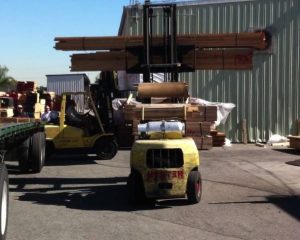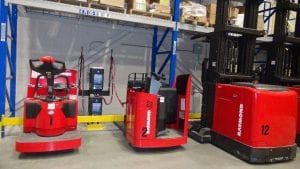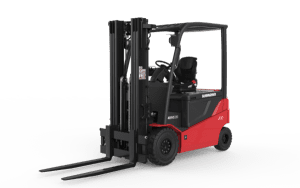For many years, propane-powered forklifts were the norm for a very simple reason- they provided longer-lasting consistent power compared to previous battery-powered forklifts. Over the last 30+ years, battery-powered forklift fleets have become more dominant in the market, with electric lifts now outselling propane lifts by 60%. The next wave of conversions is now taking shape for heavier-duty outdoor propane and diesel trucks, especially popular in the lumber and building products industry. With the advancements in lead acid and lithium-ion batteries and the technology that permits electric trucks to operate outdoors in all kinds of weather, the reasons for staying with propane/diesel power are dwindling.
by 60%. The next wave of conversions is now taking shape for heavier-duty outdoor propane and diesel trucks, especially popular in the lumber and building products industry. With the advancements in lead acid and lithium-ion batteries and the technology that permits electric trucks to operate outdoors in all kinds of weather, the reasons for staying with propane/diesel power are dwindling.
When looking at the benefits of battery-powered trucks, such as productivity, overall performance, safety, sustainability, and cost savings, it’s clear that battery-powered forklifts are the best option to power your fleet of trucks.
Here are four compelling reasons why.
1. Cost – Simply put, propane is more expensive than electricity. Propane prices tend to be highly variable, while electricity is much more stable. In fact, the Electric Power Research Institute studies have found that $0.40 worth of electricity provides the same amount of work as $2.50 worth of propane, a huge savings that goes right to your bottom line. Battery-powered forklifts are also less costly to service and maintain, lowering their overall ownership cost.
2. Efficiency – Propane trucks used for multiple shift operations typically start the shift with a full propane tank. The truck is used throughout the first shift, possibly using only 1/2 or 2/3 of the tank. With the second shift approaching, a new tank is swapped out. The remaining fuel in the tank is wasted as you are always charged for a new full LPG tank. Forklift batteries are very efficient. There is no need to change tanks. Today’s batteries and chargers typically provide eight hours of power, and if needed for multiple shifts, they can now be opportunity and fast charged. Opportunity and fast charging technology allow batteries to provide consistent power over multiple shifts by keeping the AHC between 50-75% while in use.
possibly using only 1/2 or 2/3 of the tank. With the second shift approaching, a new tank is swapped out. The remaining fuel in the tank is wasted as you are always charged for a new full LPG tank. Forklift batteries are very efficient. There is no need to change tanks. Today’s batteries and chargers typically provide eight hours of power, and if needed for multiple shifts, they can now be opportunity and fast charged. Opportunity and fast charging technology allow batteries to provide consistent power over multiple shifts by keeping the AHC between 50-75% while in use.
3. Environment and Safety –Fumes from internal combustion trucks, especially in tight areas like trailers, can be nauseating. On top of that, utilizing battery-powered forklifts also contributes to sustainability. Electricity is the most environmentally sustainable fuel choice, producing the lowest amount of greenhouse gas, but typical lead acid batteries are 98% recyclable. For these reasons, utilizing battery-powered forklifts provides a safer, more sustainable workplace.
4. Performance – As mentioned earlier, propane and diesel were widely used in the past to provide greater power and performance in heavy-duty multiple-shift operations. With the transition from DC to AC electric motors and other technological advancements, battery-powered forklifts have significantly improved their performance in side-by-side tests vs. propane. In fact, today’s battery-powered equipment provides an exact or better level of power and performance than propane. This doesn’t mean that all high or heavy-use applications, especially outdoor trucks, should be converted in all situations. But the advent of technologies like lithium-ion batteries and opportunity and fast charging of lead acid batteries can make converting to electricity easier to do.
operations. With the transition from DC to AC electric motors and other technological advancements, battery-powered forklifts have significantly improved their performance in side-by-side tests vs. propane. In fact, today’s battery-powered equipment provides an exact or better level of power and performance than propane. This doesn’t mean that all high or heavy-use applications, especially outdoor trucks, should be converted in all situations. But the advent of technologies like lithium-ion batteries and opportunity and fast charging of lead acid batteries can make converting to electricity easier to do.
With all of this said, in most cases, battery-powered equipment is now more sustainable, cost-effective, efficient, and as powerful as propane. In fact, within the next 10 years, there will likely be very few propane forklifts in use, especially in indoor warehousing operations.
Not convinced yet?
Plug your variables in this ROI calculator and see if a lithium-ion battery makes sense for your business.
You may be eligible for an electric cash incentive if you’re a National Grid customer. Contact your local forklift dealer to find out more.



Leave a Reply
You must be logged in to post a comment.